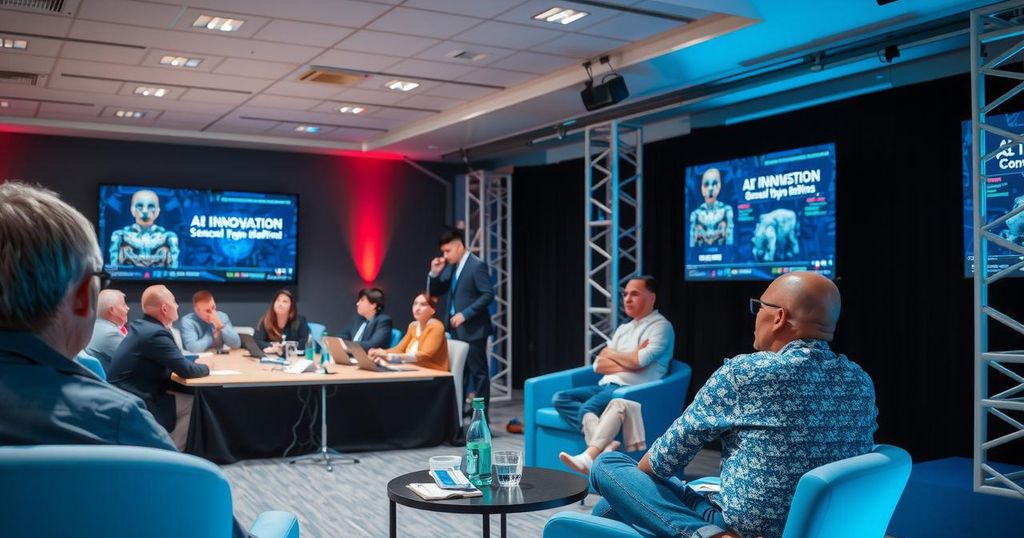AI
AI, AI INSTITUTE, ARGENTINA, ARTIFICIAL INTELLIGENCE, BRAZIL, COLLABORATION, COLO, COLORADO, DEFINING AI, ENTREPRENEURSHIP, ETHICS, LA PLATA, LA PLATA COUNTY, LA PLATA ECONOMIC DEVELOPMENT ALLIANCE, MARIO MARTINEZ, MARTINEZ, MENTAL HEALTH, NIC, NICHOLE STERLING, SARAH TOBER, SOUTH AMERICA, STERLING, TOBER, TOM MIASKIEWICZ, VENTURE CAPITAL
Liam Kavanagh
0 Comments
Navigating the Future of AI: Insights from Fort Lewis College Conference
The recent AI conference at Fort Lewis College brought together about 400 participants to explore the impact of Artificial Intelligence on society. With keynote speeches and interactive sessions, experts discussed both the transformative potential of AI and its ethical challenges. Provost Mario Martinez and keynote speaker Nichole Sterling emphasized the importance of community engagement and the need for human oversight in AI applications, ensuring a balanced approach as communities embrace technology.
In the picturesque town of Durango, Colorado, the Fort Lewis College (FLC) recently hosted a transformative conference titled “Our Journey Begins Here.” This gathering, co-sponsored by FLC and the La Plata Economic Development Alliance, saw around 400 attendees diving into the complex world of Artificial Intelligence (AI), where optimism dances with ethical quandaries. Key speakers, panels, and interactive sessions explored AI’s profound influence on our lives, businesses, and communities, underscoring both its incredible potential and the challenges it poses.
FLC Provost Mario Martinez opened the day with a relatable reflection on AI’s omnipresence in conversations. He captured the spirit of the event by emphasizing, “This day is about engaging in that conversation—learning together and having some fun along the way.” The event acted as a convergence point where public and private sectors could unite, inspired by La Plata Economic Development Alliance Executive Director, Sarah Tober’s vision of understanding AI’s local impacts.
Keynote speaker Nichole Sterling illuminated AI’s dual nature, describing it as a powerful tool at a pivotal moment in human history. While AI provides innovative solutions for challenges like affordable housing, she pointed out potential ethical pitfalls, warning of ingrained biases within AI systems. Sterling reminded the audience of the essential human role in this tech-driven era with her poignant words: “Technology is here to assist us, not replace us. AI needs human intelligence to truly be transformative.”
Tom Miaskiewicz from the FLC AI Institute provided insights into the evolution of AI, sharing how its capabilities have transitioned from theoretical to practical applications. Drawing attention to tools like ChatGPT, he noted, “AI is exciting, but it’s also unsettling. It’s important to understand its capabilities and limitations so we can use it responsibly.”
Hands-on breakout sessions invited participants to engage directly with AI, whether by designing apps without coding or examining its applications in education. The atmosphere buzzed with curiosity as local innovators showcased how AI could enhance educational personalization and marketing efforts, echoing Sarah Tober’s sentiment that while AI excels in analyzing patterns, it’s the human experience that guides its direction.
As the conference neared its conclusion, Sterling inspired attendees, encouraging them to embrace AI’s value while remaining vigilant about its flaws. She concluded with a call to action: “This technology is here to stay. By learning its strengths and limitations, we can demand better solutions and build tools to address real-world challenges.” Martinez beautifully encapsulated the essence of the discussions, stating, “AI has tremendous potential, but its success depends on striking the right balance between automation and the human element. Let’s continue the conversation and innovate responsibly.”
The conference marked a significant milestone for La Plata County, serving as a crucial starting point for embracing the complexities of AI. As attendees left with new insights and a sense of purpose, it was clear that the journey of understanding AI’s role in society had only just begun.
Artificial Intelligence is a rapidly evolving field influencing various aspects of modern life. It promises to streamline tasks, enhance business operations, and offer innovative solutions to social problems. However, as AI permeates deeper into society, it also raises ethical dilemmas, particularly concerning bias, job displacement, and the importance of maintaining human oversight. Discussions around these themes are crucial for understanding how communities can responsibly leverage AI for positive outcomes while addressing its inherent challenges.
Overall, the conference at Fort Lewis College catalyzed meaningful dialogue on the dual-edged nature of AI, highlighting the need for awareness, ethics, and human engagement in its advancement. As communities like La Plata County navigate the future, fostering conversations and collaboration will be essential to harnessing AI’s capabilities while mitigating its risks. In this balancing act, awareness and proactive engagement can turn potential challenges into opportunities for innovation.
Original Source: www.fortlewis.edu




Post Comment